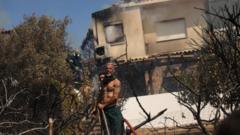The region braces for extreme heat, prompting health alerts and emergency measures as wildfires emerge.
Southern Europe Faces Scorching Heatwave with Hazard Warnings

Southern Europe Faces Scorching Heatwave with Hazard Warnings
Unprecedented temperatures threaten public health and safety across multiple nations.
As Southern Europe enters a sweltering heatwave this weekend, temperatures are forecast to soar beyond 40°C, igniting health and fire warnings across affected nations including Italy, Greece, France, Spain, and Portugal. The Spanish city of Seville is bracing for an alarming peak of 42°C, driven by hot air surging from North Africa. Experts from BBC Weather describe this heatwave as "very intense" for early summer, as such extreme heat is typically expected later in July and August.
In light of the soaring temperatures, emergency personnel in Spain are prepped for increased incidents of heatstroke, particularly concerning for children, the elderly, and those with pre-existing health conditions. Residents in Italian cities such as Rome, Milan, and Venice are being urged to remain indoors during the hottest hours of the day, especially as A-list celebrities gather for a prominent wedding in Venice this weekend, emphasizing the need for public awareness.
France has been grappling with heat for over a week and recently issued orange heat alerts—its second-highest warning—for the southern regions. To combat the oppressive heat, some municipalities in Marseille have responded by opening public swimming pools free of charge until the heatwave subsides. Similar alerts for yellow and amber have also been announced in parts of England, with temperatures expected to reach around 32°C this weekend.
The forecast indicates that this heatwave will persist until Tuesday evening, with wildfires becoming a growing concern. In Greece, coastal towns near Athens have already witnessed devastating fires, leading to mandatory evacuations as property and lives at risk. While pinpointing individual extreme weather phenomena to climate change is complex, scientists at World Weather Attribution have noted a significant increase in the occurrence and intensity of heatwaves due to shifting climate patterns. According to their research, such June heatwaves, defined as three consecutive days above 28°C, are now approximately ten times more likely than they were during pre-industrial times.
In light of the soaring temperatures, emergency personnel in Spain are prepped for increased incidents of heatstroke, particularly concerning for children, the elderly, and those with pre-existing health conditions. Residents in Italian cities such as Rome, Milan, and Venice are being urged to remain indoors during the hottest hours of the day, especially as A-list celebrities gather for a prominent wedding in Venice this weekend, emphasizing the need for public awareness.
France has been grappling with heat for over a week and recently issued orange heat alerts—its second-highest warning—for the southern regions. To combat the oppressive heat, some municipalities in Marseille have responded by opening public swimming pools free of charge until the heatwave subsides. Similar alerts for yellow and amber have also been announced in parts of England, with temperatures expected to reach around 32°C this weekend.
The forecast indicates that this heatwave will persist until Tuesday evening, with wildfires becoming a growing concern. In Greece, coastal towns near Athens have already witnessed devastating fires, leading to mandatory evacuations as property and lives at risk. While pinpointing individual extreme weather phenomena to climate change is complex, scientists at World Weather Attribution have noted a significant increase in the occurrence and intensity of heatwaves due to shifting climate patterns. According to their research, such June heatwaves, defined as three consecutive days above 28°C, are now approximately ten times more likely than they were during pre-industrial times.




















